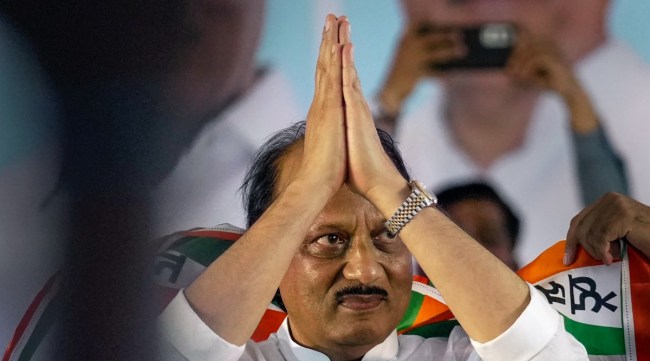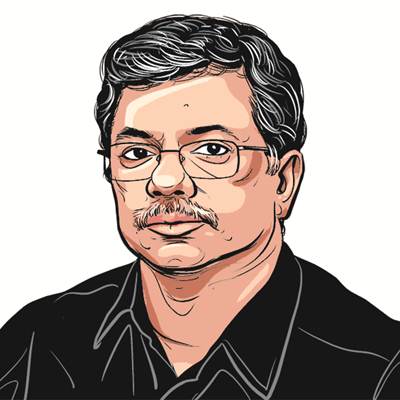Opinion The Maharashtra model and lessons for national politics
For Fadnavis, outsmarted by NCP leader Sharad Pawar in his pursuit of a second consecutive term as CM in 2019, this was sweet revenge.
 Maharashtra Deputy Chief Minister and NCP leader Ajit Pawar during the party meeting at MET Bandra, in Mumbai, Wednesday, July 5, 2023. Both factions of NCP led by Ajit Pawar and Sharad Pawar are holding separate meetings. (PTI Photo)
Maharashtra Deputy Chief Minister and NCP leader Ajit Pawar during the party meeting at MET Bandra, in Mumbai, Wednesday, July 5, 2023. Both factions of NCP led by Ajit Pawar and Sharad Pawar are holding separate meetings. (PTI Photo) Dear reader,
On June 27, Prime Minister Narendra Modi, at a public meeting in Bhopal, spoke about the Nationalist Congress Party (NCP) being involved in a Rs 70,000-crore scam. Less than a week later, eight MLAs of the NCP, four of them facing a probe by the Enforcement Directorate for corruption, took oath as ministers in Maharashtra. BJP leader Devendra Fadnavis, who had led the chorus against the NCP’s alleged corruption, was in attendance to welcome Ajit Pawar to the state cabinet as deputy chief minister.
For Fadnavis, outsmarted by NCP leader Sharad Pawar in his pursuit of a second consecutive term as CM in 2019, this was sweet revenge. Pawar Sr had reportedly masterminded the formation of the Maha Vikas Aghadi government by convincing the then Shiv Sena supremo Uddhav Thackeray to leave the NDA and lead the MVA with support from the NCP and Congress. He had also foiled Fadnavis’ move to form a government with Ajit Pawar.
By winning over Ajit Pawar and splitting the NCP, BJP has turned politics in Maharashtra on its head. Within the span of a year, the party has induced splits in both the Sena and the NCP. The MVA, which appeared the front runner to corner most of the 48 Lok Sabha seats in 2024 until the other day, has been reduced to a wreck. A bruised Pawar has promised to rebuild the NCP. So has Uddhav Thackeray. The Congress has stood with its allies, without hiding its ambition to lead the Opposition in the state.
The Indian Express editorial (‘Game of Thrones’, July 3) wrote: “While Maharashtra debunks the BJP’s self-righteous rhetoric on corruption, and raises questions about its willingness to bend the rules of the game, it also punches a hole in the viability of the Opposition front-to-be”. With the BJP set to rebuild the NDA ahead of the general election, will the Maharashtra model be tried out in Bihar, West Bengal and other non-BJP states? The BJP once spoke about a Congress-mukt Bharat. Has it now shifted its focus to the regional behemoths? Can the latter, most of them now reduced to family enterprises, stay intact if the BJP offers better political options to second-rung leaders?
A few days before the NCP split, at an Idea Exchange at The Indian Express, Mumbai, Fadnavis had said: “We want to do ethical politics but I can’t promise that I do ethical politics 100 per cent. We have to compromise sometimes. I do too. Idealism is good, but if you’re kicked out, who cares?”
Yes, who cares?
In 2019, the BJP and Shiv Sena sought the mandate together. The voters rejected the NCP and Congress. That did not prevent Uddhav Thackeray from changing sides when offered the CM’s chair. Eknath Shinde broke the Sena and returned to the NDA because he could be CM. Now, the NCP leaders who defected have said office is necessary to serve the people. It is always in the name of the people!
Suhas Palshikar (‘The walking wounded’, July 5) and Girish Kuber (‘Uncle, nephew aur woh’, July 4) were scathing in their analysis of the power games in Maharashtra. Palshikar wrote: “Since the party’s inception in 1999, the NCP has been a vehicle for exercising formal governmental power for its top leaders. Most of them have spent their early years close to centres of power and do not have the stamina to work as members of an Opposition party — they are clueless about oppositional mobilisation. Since 2014, most of them have been listless like fish out of water.” But would the BJP emerge the winner in 2024 now that it has two “crutches”(the Sena and NCP breakaways)? Palshikar writes: “There is a catch to this, though: Sympathy for the parties that have lost can hurt the BJP. Also, in the Maharashtra assembly elections, the BJP will have to postpone its ambition of ‘shat pratishat Bhajapaa’ (coming to power on its own). A Lok Sabha bounty will be dependent on sharing power with the two breakaway groups — unless the BJP manages to decimate and dump them.”
Kuber felt “the tearing hurry the BJP has displayed in engineering yet another split shows its desperation”. He wrote that “it has dawned on the BJP that former Sena men may not give the expected political dividend.” Hence, the overture to the NCP. And it chose the playbook of Sharad Pawar, who has been a master of engineering defections, splits and mergers since the 1970s in the pursuit of power. But it would have surely hurt the master politician when men who owe their careers entirely to him wondered why he was refusing to retire at 83 or complained that the fulcrum of his politics was now his daughter. “Saheb”, the tallest leader in Maharashtra today, has said he would seek validation for his political stance in the court of the people. Electoral politics in Maharashtra has never been so unpredictable.
Partha P Majumder (‘Smoothing the path of science’, July 4) and Deepak Pental (‘Funding the future’, July 7) wrote on the merits of the newly announced National Research Foundation. D B Venkatesh Varma drew 10 military lessons from the Ukraine conflict for India (‘Changing battlefields’, July 8) while C Raja Mohan wrote about the idea of swing states that Goldman Sachs predicts would influence the global economy and balance of powers in the coming years (‘The rise of swing states’, July 5). At a time of immense churn in national and global politics and economy, Shobhit Mahajan invited readers to listen to the universe “hum” (‘Hearing the universe hum’, Judy 6). Clearly, even the sky is not the limit.
Thank you,
Amrith
Amrith Lal is Deputy Editor with the Opinion team






